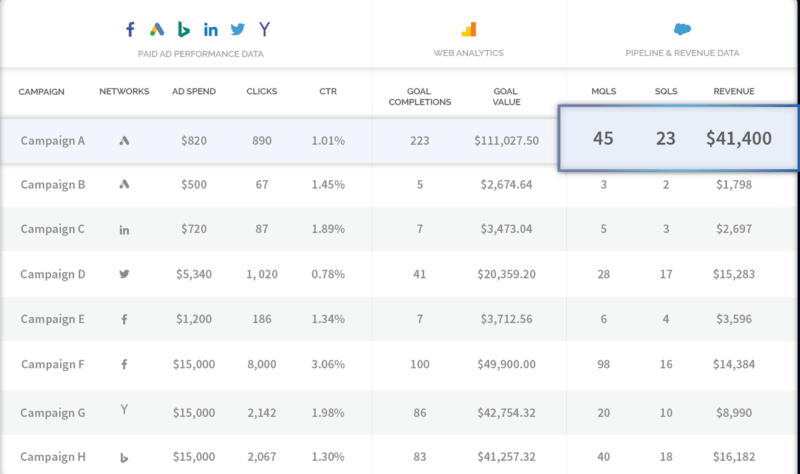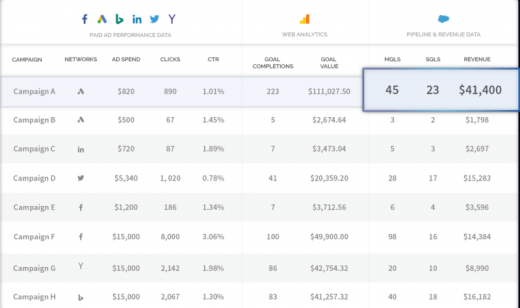AdStage launches Join to automatically unify campaign, analytics, sales data in one dashboard
Customers will have full-funnel visibility into how their search and social campaigns are driving sales outcomes.

Source: AdStage. An example of leads data available in AdStage Join.
Does this scenario sound familiar? Marketing rejoices in all the leads it sent to sales. Sales grumbles that too many of the leads were garbage. Animosity and bitterness fester until the two teams function more like competitors rather than like a unit working toward the same goal. If you’ve worked in a B2B-oriented business for any length of time, this is a story you’ve likely heard before.
To help shift this paradigm and help align sales and marketing teams, AdStage launched Join on Tuesday.
What problem is it trying to solve? The San Francisco-based campaign reporting and automation startup’s new product pairs sales and marketing data in one dashboard. AdStage Join launches in response to what the company sees as a “macro movement” toward addressing the need for marketing and sales alignment.
“At the very least, [sales and marketing] need to be sharing data if not working directly together,” said AdStage co-founder and CEO Sahil Jain in an interview last week. “Only the most sophisticated organizations are doing this, and they have to do it manually in Excel. That’s time intensive and error-prone.” Additionally, Jain said, most of these efforts only get to the campaign level.
To give marketers the full view of how their campaigns perform for the sales team, Join brings together campaign data from search and social channels such as Google, Bing, Facebook and LinkedIn, on-site behavioral data from Google Analytics and lead and sales data from Salesforce.
How does it work? Join automatically maps sales and campaign data together, without the need for URL rewrites. As illustrated in the screenshot above, advertisers can see cross-channel campaign data from both Google Analytics and Salesforce all in one view. Marketers can then drill down to the keyword level for optimization insights.
Jain stressed this is not a multi-touch attribution product: “Maybe one day we’ll get there, but for now we’re just connecting the data.” If you’re using Bizible, for example, AdStage brings in that already attributed data. Join can also be used with AdStage’s other products. For example, an advertisers could set rules for Facebook campaigns in Automate based on sales data it sees in Join.
AdStage Join, is the fourth in its suite, which also includes an analytics product called Report and campaign automation solution Automate, along with the AdStage Data API.
Who is the target customer? Join is aimed primarily at providing a solution for B2B focused, lead generation advertisers. Jain says the current customer base is fairly evenly split between agencies and direct clients. “This is a new tool for agencies to go beyond top of funnel for clients and be held to a higher standard,” said Jain.
Digital agency 3Q Digital has been using Join in beta for roughly 6 weeks. CEO David Rodnitzky said optimizing campaigns based on sales data had been a painful challenge prior to the agency’s adoption of Join, noting that connecting ad data to Salesforce saves staffers time and provides critical information.
Why you should care. Join surfaces data from each step of the funnel — from ad impression and click to lead and revenue — across search and social channels in one dashboard. Bringing data sources together in a frictionless way could save marketers buckets of analysis time and help the sales and marketing teams work more more efficiently together toward shared goals. AdStage says it now sees more than $900 million in ad spend annually on its platform.
Marketing Land – Internet Marketing News, Strategies & Tips
(37)



